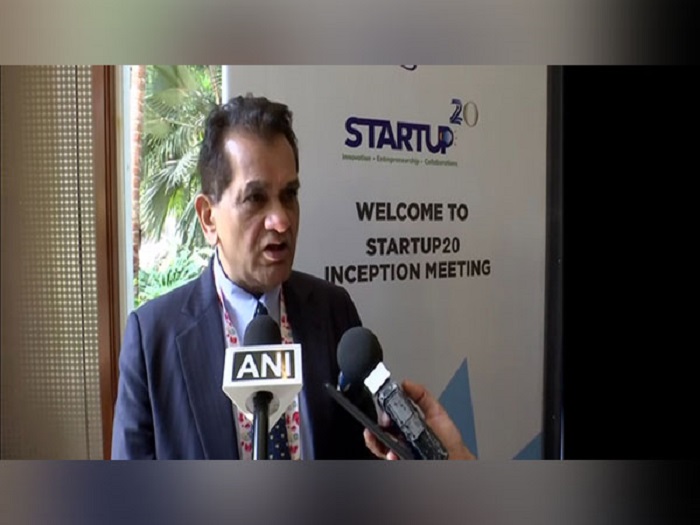
New Delhi: India has emerged as the third-largest startup ecosystem in the world. As of May 31, 2023, over 99,000 startups have been recognised by the Department for Promotion of Industry and Internal Trade (DPIIT) spanning over 670 districts across the country. The Indian startup ecosystem has witnessed exponential growth in the past few years, especially since 2015.
In the past eight years, an average of four startups were registered every hour in India. Notably, nearly 47 per cent of the total startups in India are in tier 2 and tier 3 cities. Giving wings to women's aspirations, more than 45 per cent of the total startups are women-led. India has been registering a 15 times increase in the total funding of startups, a nine times increase in the number of investors, and a seven times increase in the number of incubators.
India is the fastest-growing major economy today. This dynamic of the Indian economy, supported by government initiatives, has spurred Indian startups to make a leap and grow massively. Indian startups today are developing innovative solutions and technologies. On the innovation quality parameter, India today ranks second. India also holds top positions in the quality of scientific publications as well as its Universities among the middle-income countries.
In the Financial Year 2016-17, nearly one unicorn was added annually. But in the last four to five years the rate of unicorns in the Indian startup ecosystem has been growing exponentially with a year-on-year growth rate of 66 per cent. As of May 31, 2023, India boasts 108 unicorns having a total valuation of USD 340.8 billion. Out of these, 44 startups became unicorns in 2021 and 21 became in 2022, showing the rapid transformation of the startup ecosystem in India. Globally, out of ten unicorns, one is from India, with the country churning at least one unicorn every month.
In a recently published report titled “The State of Indian Startup Ecosystem Report, 2022” by Inc42, a leading Indian media and information platform, some staggering facts have come forth. The Indian startup ecosystem is witnessing tremendous growth owing to a steady rise in venture capital inflow. Since 2014, the venture capital funding to Indian startups has grown by 8.4 times reaching USD 42 billion in 2021 from merely USD 5 billion in 2014.
As per the report, the compound annual growth rate (CAGR) of funding to Indian startups has outpaced that of China. Indian startups recorded a CAGR of 49 percent during 2014 to 2021 while China recorded 12 per cent CAGR in the same period. The report posits that the momentum will be maintained, enabling India to become the second-largest startup ecosystem in the world by 2025. The report notes that by the year 2025, the total valuation of Indian startups is expected to reach more than USD 450 billion and the number of unicorns will rise to 250.
Another noteworthy aspect of the Indian startup ecosystem is the increasing number of jobs that it has been creating in the marketplace. Since 2016, there has been an increase of 525 per cent in jobs created by Indian startups. In 2016, the number of jobs created stood at 10, which by 2022 increased to 2,68,823 jobs in a year, thus creating a total of over 9 lakh jobs so far.
Apart from IT, e-commerce and fintech sectors, some of the other sectors that are worth mentioning include healthcare and social commerce. With the post-pandemic impact and a CAGR of 39 per cent, the health-tech market in India is expected to reach the mark of USD 5 billion in 2023. The digital revolution currently taking place in India coupled with favourable government policies is facilitating the growth of this market. A number of unicorns are present in the health-tech sector, including startups like Innovaccer (which analyses healthcare data to provide actionable insights to healthcare providers, insurance companies, hospitals, etc.), Pharmeasy (an online pharmacy and diagnostics brand), Tata1mg, etc. In this segment, start-ups like Practo, HealthifyMe, among others, also look promising with their growth trajectories.
Another notable feature of the Indian startup ecosystem is the growth of social commerce. This segment has made it possible to unlock tier 2 and tier 3 markets and achieve low margin categories, especially in fast-moving consumer goods (FMCG) and grocery segments, which the large e-commerce companies could not do sufficiently so far. In this segment, Meesho has become the first Indian social commerce startup to enter the unicorn club with a valuation of USD 2.1 billion. It is an online reseller network for small and medium businesses as well as individuals, selling products within their network on social media platforms like Instagram, WhatsApp, and Facebook. Social commerce is a fast-growing category of Indian startups with upcoming startups like SimSim, CityMall, and GlowRoad, etc.
The credit for creating an enabling environment for startups to incubate, grow and thrive must also be given to the efforts put in by the government. The government’s flagship scheme Startup India kickstarted a startup revolution in India. Several policy interventions were subsequently initiated providing a launch pad to the Indian startup ecosystem. These include Startup India Seed Fund Scheme, JAM Trinity, UPI, India Stack, tax exemptions to angel funding, National Initiative for Developing and Harnessing Innovations, and Atal Innovation Mission, among others.
With such dynamism and growth trajectory, India is emerging as a superpower in the startup ecosystem. With a sizable population and a growing economy, India offers promising opportunities to Indian entrepreneurs. The investor landscape in India which includes angel funding, venture capital, and private equity, is expected to further expand in the coming years. With the digital revolution in India and the requisite government support, India is poised to become a hub for innovation and entrepreneurship. Further strengthening India’s case of emerging as a startup superpower.